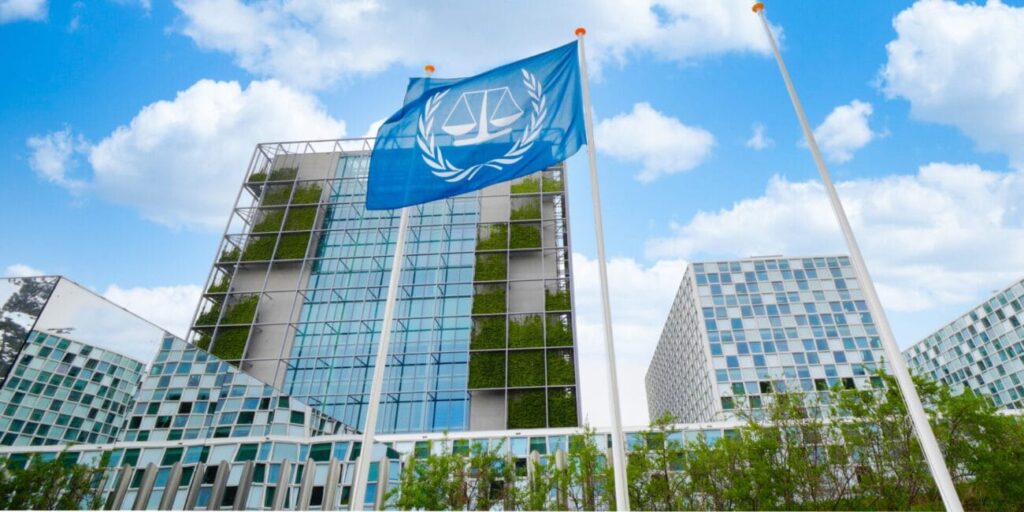Understanding ICC’s Arrest Warrant Application for Myanmar Military Leader: Anti-Genocide Perspective
TRANSCEND MEMBERS, 2 Dec 2024
Maung Zarni | FORSEA – TRANSCEND Media Service

The Hague, Netherlands: The International Criminal Court-ICC has jurisdiction to prosecute individuals for the crimes of genocide, crimes against humanity, war, and aggression.
Photo: SARATSTOCK, Shutterstock
28 Nov 2024 – Without the willing executioners and cheerleaders, no state is capable of large-scale crimes against humanity of which genocide is one, from the Nazi genocide to Rwanda, to Indonesia’s CIA-facilitated genocide of ethnic Chinese and communists, to the ongoing Israel’s genocide in Gaza. Myanmar’s genocide of Rohingya is no exception.
Myanmar’s generally anti-military public including Burmese language journalists, armed fighters, exiles and members of the multiethnic and multifaith diaspora are jubilant upon hearing the news about the application made to the Pre-Trial Chamber judges today (27 November) by the International Criminal Court Prosecutor and British barrister Karim Khan, seeking the judges’ arrest warrant for the Myanmar military leader Min Aung Hlaing, the commander-in-chief of Myanmar’s national armed forces, known as Tatmadaw and the leader of the 2021 military coup, which ousted Aung San Suu Kyi’s populist civilian government.
The prosecutor Khan stated that Min Aung Hlaing bears the command responsibility for the crimes against humanity of deportation and persecution of the Rohingya people – predominantly Muslims – within Myanmar’s national boundaries, and on Bangladesh’s soil, which were perpetrated by Myanmar’s national military with the support of Myanmar police, border guard forces and non-Rohingya civilians of Myanmar.
For the millions of Rohingya survivors of Myanmar’s international crimes – in refugee camps, in diaspora, in limbo as “stateless” people in Malaysia, Saudi Arabia, India, Pakistan, Indonesia, and Thailand – the court and the prosecutor’s office have come to be seen as lacking any real political will to establish accountability for them since the ICC first embarked on an investigation into the crimes against humanity in November 2019. It is indeed a cliché now to say justice delayed is justice denied.

Rohingyas at the Kutupalong refugee camp in Bangladesh, October 2017. Wikipedia Commons
I find it curious the timing of the Prosecutor’s publicised quest for the judges’ issuance of the first ever arrest warrant for Myanmar military leader, in the history of the country’s slow-burning genocide since it was launched and institutionalized under the bogus pretext of cracking down on “illegal immigration” of Bangali Muslims.
The prosecutor filed his Myanmar application in less than a week after the same UN court issued the 21-November-dated arrest warrants for Israeli Prime Minister Benjamin Netanyahu, former Defense Minister Yoav Gallant, and a senior Hamas official, alleging them of committing war crimes during the 7 October attack on Israel and Israel’s subsequent devastating attack on 2.3 million Palestinians in Gaza.
In the face of vicious, arrogant and racist attacks by the United States’ political leaders from both parties over the Court for daring to go after Washington’s two mass-murderous Israeli “bastards”– Netanyahu and Gallant – the court and prosecutor’s office are obviously standing up for themselves – for the integrity of the court, the instrument of international law and the United Nations itself.
So, whatever the triggers behind the Prosecutor’s application for the issuance of the arrest warrant for Senior General Min Aung Hlaing Khan’s quest is to be welcome by all of us rights activists, campaigners against genocides and other crimes against humanity.
But as my dear friend Gayatri Chakravorty Spivak said pointedly at the International Conference on the Rohingya genocide at Wolfson College, Oxford in May 2016, “the United Nations is not the end of the road and law is not justice.”
We must approach genocides and other crimes against humanity beyond legal accountability. Locking up, if at all, a handful of Myanmar generals and a few others who incited the genocidal deportation of more than 50% of the Rohingya people from their ancestral homeland of Northern Rakhine state will not be justice for Rohingya people. Rohingyas will need their own homeland – that is, literally LAND – where they are not subordinated to or subject to the constant racist domination, murderous and violent Islamophobia and military control by the Arakan Army, which is nothing but the embodiment of ethno-nationalist Rakhine Buddhists.

In that connection, I take as most significant Karim Khan’s deliberate inclusion of “non-Rohingya civilians” as, in effect, executioners, cheerleaders, supporters, supporters, inciters and collaborators in Senior General Min Aung Hlaing’s genocide. In the midst of the mass-deportation, mass-slaughter and wholesale destruction of thousands of homes and places of religious warship – all belonging to Rohingyas in the fall of 2017 – Min Aung Hlaing had ordered his troops to finish “the unfinished business” of Rohingya presence on Myanmar’s soil.
This, Myanmar troops attempted to do at the expense of 1 million genocidally deported Rohingya people of all ages, professions and sexes.
The world must not forget that this level of state-organized crime could not have been accomplished by a single institution of the military – without the cheer-leading, active support and collaboration by the non-Rohingya civilians, inside Rakhine state (that is, majority Rakhine Buddhists) and the Myanmar civil society at large, multi-ethnic political parties, the flagship ruling party of the National League for Democracy, and above all leading Buddhist monks and the Mother of Myanmar, namely the 1991 Nobel Peace Laureate Aung San Suu Kyi.
Without the willing executioners and cheerleaders, no state is capable of large-scale crimes against humanity of which genocide is one, from the Nazi genocide to Rwanda to Indonesia’s CIA-facilitated genocide of ethnic Chinese and communists to the ongoing Israel’s genocide in Gaza. Myanmar’s genocide of Rohingya is no exception.
Genocidal states are usually anchored in genocidally racist civil societies. This, neither Karim Kham’s ICC or the International Court of Justice where the Gambia vs Myanmar genocide case is in its merit phase, can fix or repair.
It is absolutely crucial for all non-Rohingya civilians of Myanmar – including those in the diaspora, that they must search their soul. Their names will be forever inscribed in the annals of world’s genocide as “supporters” of international crimes.
They – not me who has renounced my “Burmese identity” in the midst of Burmese genocide – have failed to speak out or lift a finger when Rohingyas were subjected to crimes of mass deportation and persecution.
___________________________________________
 A Buddhist humanist from Burma (Myanmar), Maung Zarni, nominated for the 2024 Nobel Peace Prize, is a member of the TRANSCEND Network for Peace Development Environment, former Visiting Lecturer with Harvard Medical School, specializing in racism and violence in Burma and Sri Lanka, and Non-resident Scholar in Genocide Studies with Documentation Center – Cambodia. Zarni is the co-founder of FORSEA, a grass-roots organization of Southeast Asian human rights defenders, coordinator for Strategic Affairs for Free Rohingya Coalition, and an adviser to the European Centre for the Study of Extremism, Cambridge. Zarni holds a PhD (U Wisconsin at Madison) and a MA (U California), and has held various teaching, research and visiting fellowships at the universities in Asia, Europe and USA including Oxford, LSE, UCL Institute of Education, National-Louis, Malaya, and Brunei. He is the recipient of the “Cultivation of Harmony” award from the Parliament of the World’s Religions (2015). His analyses have appeared in leading newspapers including the New York Times, The Guardian and the Times. Among his academic publications on Rohingya genocide are The Slow-Burning Genocide of Myanmar’s Rohingyas (Pacific Rim Law and Policy Journal), An Evolution of Rohingya Persecution in Myanmar: From Strategic Embrace to Genocide, (Middle East Institute, American University), and Myanmar’s State-directed Persecution of Rohingyas and Other Muslims (Brown World Affairs Journal). He co-authored, with Natalie Brinham, Essays on Myanmar Genocide.
A Buddhist humanist from Burma (Myanmar), Maung Zarni, nominated for the 2024 Nobel Peace Prize, is a member of the TRANSCEND Network for Peace Development Environment, former Visiting Lecturer with Harvard Medical School, specializing in racism and violence in Burma and Sri Lanka, and Non-resident Scholar in Genocide Studies with Documentation Center – Cambodia. Zarni is the co-founder of FORSEA, a grass-roots organization of Southeast Asian human rights defenders, coordinator for Strategic Affairs for Free Rohingya Coalition, and an adviser to the European Centre for the Study of Extremism, Cambridge. Zarni holds a PhD (U Wisconsin at Madison) and a MA (U California), and has held various teaching, research and visiting fellowships at the universities in Asia, Europe and USA including Oxford, LSE, UCL Institute of Education, National-Louis, Malaya, and Brunei. He is the recipient of the “Cultivation of Harmony” award from the Parliament of the World’s Religions (2015). His analyses have appeared in leading newspapers including the New York Times, The Guardian and the Times. Among his academic publications on Rohingya genocide are The Slow-Burning Genocide of Myanmar’s Rohingyas (Pacific Rim Law and Policy Journal), An Evolution of Rohingya Persecution in Myanmar: From Strategic Embrace to Genocide, (Middle East Institute, American University), and Myanmar’s State-directed Persecution of Rohingyas and Other Muslims (Brown World Affairs Journal). He co-authored, with Natalie Brinham, Essays on Myanmar Genocide.
Tags: Burma/Myanmar, CIA, Crimes against Humanity, East Asia, Free Rohingya Coalition, Gaza, Genocide, Genocide Convention, Indonesia, Israel, Jews, Nazism, Rohingya, Rwanda, USA, War crimes, Warfare
DISCLAIMER: The statements, views and opinions expressed in pieces republished here are solely those of the authors and do not necessarily represent those of TMS. In accordance with title 17 U.S.C. section 107, this material is distributed without profit to those who have expressed a prior interest in receiving the included information for research and educational purposes. TMS has no affiliation whatsoever with the originator of this article nor is TMS endorsed or sponsored by the originator. “GO TO ORIGINAL” links are provided as a convenience to our readers and allow for verification of authenticity. However, as originating pages are often updated by their originating host sites, the versions posted may not match the versions our readers view when clicking the “GO TO ORIGINAL” links. This site contains copyrighted material the use of which has not always been specifically authorized by the copyright owner. We are making such material available in our efforts to advance understanding of environmental, political, human rights, economic, democracy, scientific, and social justice issues, etc. We believe this constitutes a ‘fair use’ of any such copyrighted material as provided for in section 107 of the US Copyright Law. In accordance with Title 17 U.S.C. Section 107, the material on this site is distributed without profit to those who have expressed a prior interest in receiving the included information for research and educational purposes. For more information go to: http://www.law.cornell.edu/uscode/17/107.shtml. If you wish to use copyrighted material from this site for purposes of your own that go beyond ‘fair use’, you must obtain permission from the copyright owner.
Join the discussion!
We welcome debate and dissent, but personal — ad hominem — attacks (on authors, other users or any individual), abuse and defamatory language will not be tolerated. Nor will we tolerate attempts to deliberately disrupt discussions. We aim to maintain an inviting space to focus on intelligent interactions and debates.